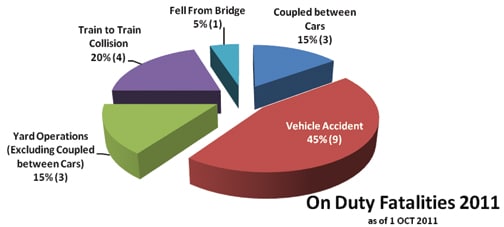During the first six months of 2011, 37 serious injuries occurred during switching operations, resulting in three fatalities and eight amputations; while over the past two years, five rail workers have died in accidents involving rolling rail equipment.
The Switching Operations Fatality Analysis (SOFA) Working Group and the UTU Rail Safety Task Force have been consulting with the FRA to study the causes and prevention of such horrific accidents, leading the FRA Oct. 11 to issue new recommendations aimed at preventing such fatalities and injuries.
The recommendations, published in the Federal Register, are intended, says the FRA, to convey to carrier management and rail workers “the critical importance of following key operating procedures when going between rolling equipment.”
These recommendations include:
* Review current operating and safety rules that specifically address remote control locomotive and conventional switching operations that require employees to go between rolling equipment, and determine whether those rules provide adequate protection to employees, or need to be updated or revised;
* Develop, implement and monitor sound communication protocols that require employees on multi-person switch crews to notify their fellow crewmembers when the need arises to enter between two pieces of rolling equipment – regardless of whether the employee is the primary RCO or working on a conventional crews.
* Review SOFA Safety Recommendation No. 1 relating to adjusting knuckles, adjusting drawbars and installing end-of-train devices, and communicate procedures implementing that recommendation to employees working in yards or other locations where the possibility of entering between rolling equipment exists.
SOFA Safety Recommendation No. 1 provides: “Any crew member intending to foul track or equipment must notify the locomotive engineer before such action can take place. The locomotive engineer must then apply locomotive or train brakes, have the reverser centered, and then confirm this action with the individual on the ground.
“Additionally, any crew member that intends to adjust knuckles/drawbars, or apply or remove EOT device, must ensure that the cut of cars to be coupled into is separated by no fewer than 50 feet. Also, the person on the ground must physically inspect the cut of cars not attached to the locomotive to ensure they are completely stopped; and, if necessary, a sufficient number of hand brakes must be applied to ensure the cut of cars will not move.”
* Convey to employees that their own personal safety is their responsibility and that railroad management supports and encourages those employees that make safety their number one priority, regardless of their immediate assignment;
* Convey to employees that they should encourage fellow employees to perform their tasks safely and in compliance with established railroad rules and procedures.
To view the FRA’s Federal Register notice, click on the following link:
http://www.gpo.gov/fdsys/pkg/FR-2011-10-11/html/2011-26283.htm
To view more information on rail safety, click on the following link:


